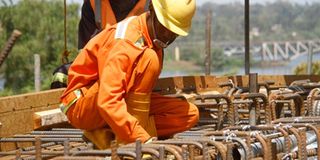Preventing construction material theft

Hold regular meetings to go over various project details and recognise individual accomplishments. If your builders know that you are aware of their activities, it makes it much more difficult to engage in questionable behaviours. Photos by Abubaker Lubowa
What you need to know:
From building materials to heavy equipment, theft at construction site is an industry-wide epidemic. The key to prevention is making it as hard as possible for would-be thieves to quickly make off with your tools, equipment and materials.
There are so many ways theft occurs at a construction site. Sometimes the last person you suspect is the culprit. When Zainab Kamurasi started constructing her rentals in Entebbe, she knew she did not have enough time to supervise so she let her boyfriend takeover.
“Because I had no cause to doubt him, I gave him money whenever it was asked for without scrutinising the list he would present. This was a grave mistake,” Kamurasi narrates. One weekend, she paid an impromptu visit to the site, to her dismay; the house was still just a shell. “Yet I had been buying tiles, glass and paint meant for finishing touches. As a matter of fact, I had gone to see how I could handle the cleaning to let tenants in,” she recounts.
I have personally heard heart-breaking accounts of Nkuba kyeyos (those working in the diaspora) who send money for constructing homes but find nothing on return.
This, Agaba Byarugaba, a site manager in Kyanja reveals is the boldest way people can cheat others commonly used by conmen. “If managing sites is your job, you cannot do that because you will not have another site to manage once your reputation has been spoiled. That is done by conmen who do not work in the industry,” he clarifies. He, however, acknowledges that theft at construction sites is possible and happens.
Some forms of theft he identifies include inflating cost of materials, labour, stealing of materials and illegally hiring out equipment. So how can you avoid falling victim to theft?
Keep records
Kamurasi learned the hard way so she decided to pay more attention to her site.
“I went out of my way to teach myself about the basics of construction so that I could be informed when the foreman asked for materials,” she narrates. It is important for the workers to know that you are fully aware of what is going on at the site. Keep proper records of the materials and make sure that whoever takes equipment out of storage signs and takes responsibility for it. It is even more imperative for the site owner to visit to check out the condition of the equipment and asses the progress in order to avoid surprises.

Kamurasi would also insist on seeing receipts of the materials. To avoid inflated salaries or ghost workers one can make an effort of knowing the workers personally or at least see their signatures appended against every name in the pay log.
Set the rules
A police officer who talked to us on condition of anonymity advises site managers and contractors to sensitise their workers about theft and its consequences.
“Some people naturally lack restraint especially when they see things lying around. The site manager should lay out strict rules and define theft for his employees. Someone might not think twice about picking a nail and taking it home yet that can be considered theft,” he explains. He also advises managers to pay their workers promptly and appropriately. “When people go unpaid or underpaid, they are tempted to steal things they can sell to make quick cash,” he adds.
Hire security
Byarugaba points out that thieves can be within or without. To avert incidences, he recommends hiring of security firms especially reputable ones that are big on technology.
“Thieves usually avoid places with security guards and surveillance systems. The cameras are especially a constant reminder of workers that they are being watched which kills any temptation,” Byarugaba observes. He further advises contractors to illuminate their sites properly to discourage would be thieves. “It is common knowledge that thieves avoid well-lit places. Put floodlights all over the site and the neighbourhood,” he adds.
Brand the materials
For thieves within the site, Byarugaba advises branding the equipment boldly to dissuade buyers or temptation for selling. And when they are stolen, chances of recovery are higher than the unbranded ones.
Kamurasi says that in order to contain wastage and expense, she would insist that her new foreman calculates the exact amount of material needed for a week and buy only that because she observes that the longer the materials stay unused the more opportunities thieves have.
Hang “No Trespassing” signs on your site. Erect a fence around your site with a gate that should be securely locked at the end of each workday.
Hire professional firms
Godfrey Tumwebaze of EREKT Construction company observes that in most cases clients are reluctant to hire established companies because they think it is expensive. However, an established company will ensure Bills of quantities negotiated fit in your budget and will cover any losses due to theft if it is well stipulated in the agreement.
“People have no trouble using anyone claiming to be an engineer without even doing due diligence. What happens when the “so called engineer” quotes a very low figure and ends up stealing of materials to try and cover any extra site labour costs?” Tumwebaze challenges.
He urges homeowners to hire professionals; get thorough building agreements and do due diligence of the person/company doing the work before employing them.




